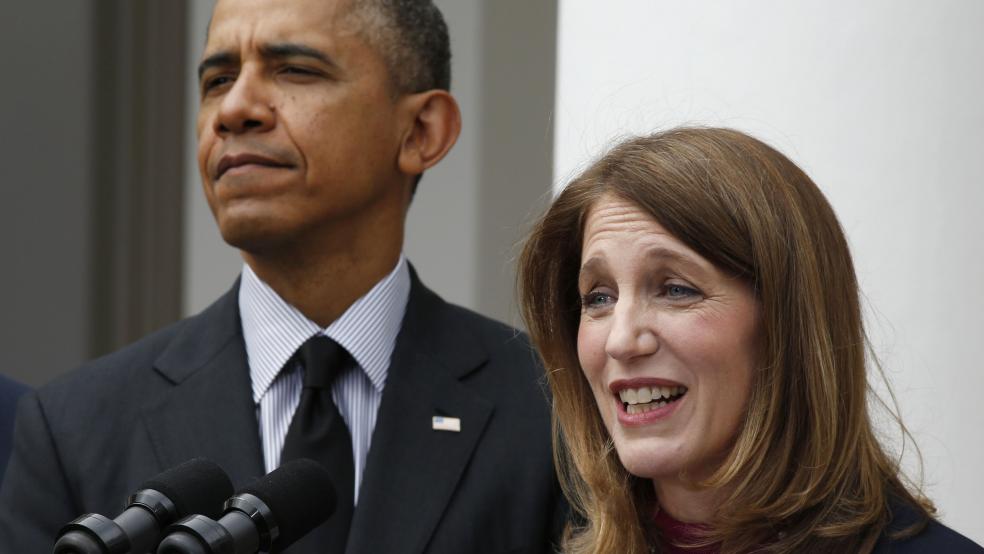Meet the new face of Obamacare.
Sylvia Mathews Burwell, President Obama's top choice to lead the massive Health and Human Services Department, will take over just as the first chapter in the president’s historic health care law comes to a close.
While the administration has deemed the Affordable Care Act’s first open enrollment period a success – with more than 7.5 million people signed up for coverage through the exchanges and even more deemed eligible for Medicaid – there is plenty of work cut out for the new HHS secretary.
Related: Obama, with Burwell on Board, Focuses on 2014 Elections
Assuming she is confirmed,Burwell’s top priority will likely be navigating the $3.1 trillion health care industry through the transition to the ACA. Though her predecessor, former HHS Secretary Kathleen Sebelius bared much of the brunt of the law’s shaky rollout, Burwell will likely face push back from Obamacare’s opponents who are still hoping to repeal the law. It will be especially challenging this fall amid the midterm elections, with Obamacare the central issue in many Republican attack ads.
Burwell’s new role will extend far beyond the ACA. Her day-to-day operations will include managing the behemoth department, which has a 2015 budget of more than $1 trillion and more than 75,000 employees nationwide.
The former director of the Office of Management and Budget will be in charge of the massive Medicare and Medicaid programs, the Food and Drug Administration ,which regulates nearly a quarter of all consumer spending, as well as the National Institutes of Health and the Centers for Disease Control and Prevention, among a spate of other lesser-known agencies.
The president chose Burwell because of her management background. Coming from the chief role at OMB, she has extensive administrative experience, including overseeing the budget for Medicare and Medicaid, as well as navigating tough budget negotiations with members of Congress.
Related: Sebelius Resignation Won’t Mute Obamacare Criticisms
“Sylvia is a proven manager, and she knows how to deliver results. And she’ll need to be a proven manager because these are tough tasks, big challenges,” Obama said in a speech announcing her nomination. “From covering more families with economic security that health insurance provides, to ensuring the safety of our food and drug supply, to protecting the country from outbreak or bioterror attacks, to keeping America at the forefront of job-creating medical research, all of us rely on the dedicated servants and scientists, the researchers at HHS and the FDA and CDC and NIH.”
Still, as former HHS secretaries can attest, it’s a tough gig. Dr. Louis Sullivan, who served as George H. W. Bush’s health secretary, told reporters at a conference in Denver that the top health post is easily “the most picketed position in the cabinet,” since it means being the face of major entitlement programs like Medicaid as well as making decisions and rules on controversial issues like abortion.
Here are Burwell’s biggest hurdles, assuming her confirmation:
1. Leading the ACA Transition
Burwell will be responsible for navigating the second open enrollment period in a tough political climate surrounding the midterm elections. She’ll also be in charge when the penalties under the individual mandate take effect – a process almost certainly destined to cause major headaches for consumers as well as confusion within the Internal Revenue Service, the agency charged with enforcing the collection provisions. She will also likely still be at the helm of the HHS when the employer mandate eventually kicks in by January of 2015 for large businesses and 2016 for medium size companies.
2. Dealing with Backlash from Rising Premiums
Insurers are already starting to warn that premiums are going up next year. Wellpoint, one of the largest insurers on the law’s exchanges, said it could raise its prices by double digits next year. Others have said they expect similarly large increases. In order to keep premiums as low as possible, some health advocates suggest that Burwell could make a rule change forcing insurers to make their rate proposals public. Under Sebelius and at the insurers’ request, their documents were kept private. Allowing them to be out in the open could provide more transparency and accountability. Insurers “want it to become conventional wisdom that rates are going to go up substantially,” Jay Angoff, a Washington-based lawyer who previously worked at HHS, told Bloomberg. “By no means should people assume rates will go up, much less go up substantially…. It is so much to consumers’ advantage, to a buyer’s advantage, and to regulators’ advantage for the public to see what assumptions the insurer makes.”
3. Further Pursuing Medicaid Expansion
Burwell will be responsible for leading the charge to expand Medicaid under the president’s health care law. Since the Supreme Court ruled in 2012 that states could decide whether or not to opt into the expansion, it created a divide. Some 24 states declined to expand their programs, creating a coverage gap and leaving 5.7 million people without health insurance. Sebelius was noted for her willingness to work with Republican governors who wanted to pursue the expansion in alternate ways. Now that torch will likely be passed to Burwell.
4. Pursuing Health Care Fraud Recovery
Under Sebelius, the government ramped up its health fraud recovery efforts. Last year, it recovered a record $4.3 billion, up from $4.2 billion in 2012. The Obama administration says for every dollar spent investigating health care fraud and abuse in the last three years, the government recovered $8.10. That’s the largest three-year average return on investment in the 17-year history of the federal Health Care Fraud and Abuse Control Program – another effort Burwell will be expected to continue.
Top Reads from The Fiscal Times:





